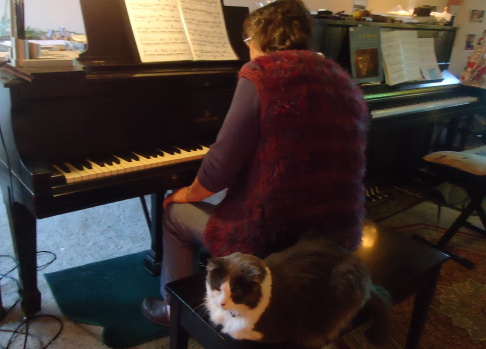I sometimes offer a bit of counseling to my brood of adults who often fall into a pit of pervasive self-punishment.
The beating up myself student, will often berate himself/herself for having played a scale or piece better before the lesson began.
The pupil reasons, if only the teacher disappeared or never showed up, he/she would be in playing heaven, coasting through an “error”-less piece, having no need for a lesson in the first place.
As part of this negative framing before the first note is played, the student will add a list of days he couldn’t practice, letting the teacher know that the PERFECTION showcase he had in mind, is a NO-go.
***
And while many high-striving students bring iPhones to lessons to record their teacher’s suggestions for reinforcement, they will more often re-play a self-generated psychic recording that drums in feelings of inadequacy.
These playbacks subsequently become injurious when students relentlessly compare progress at the piano to professional and occupational accomplishments.
From a retired lawyer into her second year of lessons:
“Why can’t I do this as well as I prosecuted criminals?”
She forgets that completing college, going to law school and practicing her trade, were time-honored, gradual learning processes not overnight achievements. (So why should she criminalize herself and her fledgling efforts at the piano?)
Apropos, I snatched the following paragraph from one of my previous postings:
“Most adults I’ve taught over decades, regardless of level, are too critical of themselves, and try to compare other fields of endeavor to piano. Meaning that what work they have methodically invested and accomplished in their chosen careers, should immediately transfer to a universe they have not inhabited nearly as long.
“But no one is born playing the piano, and if one uses the metaphor of birth, followed by stages of development such as the first smile, rolling over, pulling oneself up in the crib, crawling, and then walking, then comparable developmental landmarks apply to piano learning as well. And given that babies don’t weigh and measure each advance, or attach a value judgment but just experience a growth PROCESS as nature takes its course, the same self-acceptance is needed when studying piano.”
(Underline SELF-ACCEPTANCE)
***
From a dentist after three years of lessons:
“I pull teeth every day, do root canals, reconstruct jawlines, but I can’t manage to play this piece the ‘”right way.”‘
He has so drilled into his head that he can’t make the grade (according to his standards) that his tireless self-invalidation minus a dose of humility will reach an irreversible crescendo level jeopardizing piano study.
From a social worker delving into the works of Bach:
“Why does C. (another adult student) play those Two-part Inventions so well, when they just crash on me?”
Such unreasonable and futile comparisons are tangential to a student’s unique growth and development. More importantly, the notion of competition is not a part of our learning environment, so there’s no need to measure one pupil against another.
Nonetheless, such a self-debasing tendency by students, can infect and adversely effect piano lessons to the point of quitting.
The good news is that those who survive their first-round, self-directed knock-out punches, will emerge with a healthier perspective about the music-learning process.
They will realize that piano lessons are an enrichment of their lives–a gift to themselves with ever blossoming rewards over time–That study cannot be commodified, or measured in concrete profit/loss columns. That lessons are about self-discovery, not self-punishment.
Given this awareness, they will also come to understand that while they might have survived parental pressures in childhood to take piano, practice, be note perfect, and perform on demand, their coming back to the piano in adulthood is their own decision, without parental prodding.
***
Recently, one of my Online pupils validated the positive influence of piano lessons on her day-to-day life. She mentioned discipline, focus, centering, concentration, inspiration, gratification, challenge, tenacity, and self-growth.
One can also add enriched immersion in the great masterworks, with ongoing awakenings and epiphanies in a deep-layered learning process.
In summary, Music is about enriching one’s life with beauty, and having a partner mentor who leads and follows in a harmonious pursuit of what is largely intangible but still a miracle of creation.
LINKS:
Are Adult piano students stigmatized?
https://arioso7.wordpress.com/2011/03/06/are-adult-piano-students-stigmatized/
Adult Piano Student Themes and Issues
https://arioso7.wordpress.com/2013/01/11/adult-piano-student-themes-and-issues/
Celebrating Adult Piano Students
https://arioso7.wordpress.com/2013/12/08/celebrating-adult-piano-students/
Original Content: Adult piano student stumbling blocks and overcoming them

No comments:
Post a Comment